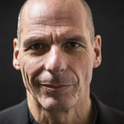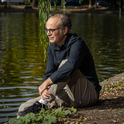Sam McDowell and I spot each other half by chance at a coffee shop in Marchmont, central Edinburgh: we’d arranged to meet, but neither of us knew exactly what the other looked like. McDowell, wearing black-rimmed glasses and green Converse shoes, is laidback and extremely courteous: he insists on paying for coffee and pauses between the whirrs of the grinder to make sure that I can hear the recording later.
Originally from Whangrei in the north of New Zealand, McDowell is one half of Edinburgh-based publisher Charco Press, alongside his partner Carolina Orloff. Specialising in original translations of contemporary Latin American literature, Charco—“puddle” in Spanish, often used in Latin America to refer to the Atlantic—has had three of its books nominated for the International Booker. Not bad for an outfit run largely by two people.
The work is not without its challenges. The English-language book market, McDowell says, has long been incurious about translation. “If you look at the size of the translated market in many European countries, it’s around 30 per cent or more. In Anglophone countries like the UK, it’s more like three and a half.” The mindset is that international fiction is too difficult, but McDowell disagrees. “In our childhood we read so much stuff that’s translated. Comics like Tintin and Asterix, The Little Prince… All of that is translated. And then, as you get older, something changes.”
Is that because as adults we become much fussier about reading the “definitive” text? McDowell smiles. “This is an interesting point,” he says. “Even a book written in English has gone through many hands; it’s been edited.” He goes back further: “Storytelling predates writing. It’s a way of understanding each other. Storytellers are wandering from village to village, telling tales, and those tales would evolve depending on the storyteller, depending on the setting. I think it’s very natural for a story to continually evolve and never be in a fixed, concrete form.”
He gives me the translation of one work they published that involves a real historical person known for wearing a distinct hat. The translator pointed out that, in the original Spanish, the author described the wrong type of hat; it should have been a Fedora, not a Stetson. When they put this to the author, they conceded that they had indeed made a mistake. “What do you do then?” McDowell asks. Correct the mistake, or stay “faithful” to the original? (He says they went with the change.)
I think it’s very natural for a story to continually evolve and never be in a fixed, concrete form
Neither McDowell nor Orloff had any experience in publishing before they started the press. McDowell’s own path was far from straightforward. “My background is in IT,” he says, before casually dropping that he once trained as a commercial pilot, “at one of the only courses for that in the southern hemisphere.” Can he still fly? He’s rusty but yes, he says, he still has his licence. He leans into the Dictaphone and adds, jokingly: “Is this relevant?”
It was during a stint travelling around Latin America that McDowell met Orloff, an Argentinian academic at the University of Edinburgh who was visiting family at the time. It was partially the fact that McDowell had never heard of—and had no access to—so many of the contemporary writers that Orloff loved that gave rise to the idea of starting a press.
Charco now also publishes original works in English—by well-known translators like Jennifer Croft and Daniel Hahn—as well as Spanish-language books in the US. Their mission remains the same: to promote Latin American voices and elevate the role of translators. And McDowell’s enthusiasm for furthering that mission is palpable. The flying might have taken a backseat, but that hasn’t stopped him from exploring some exciting new places.













